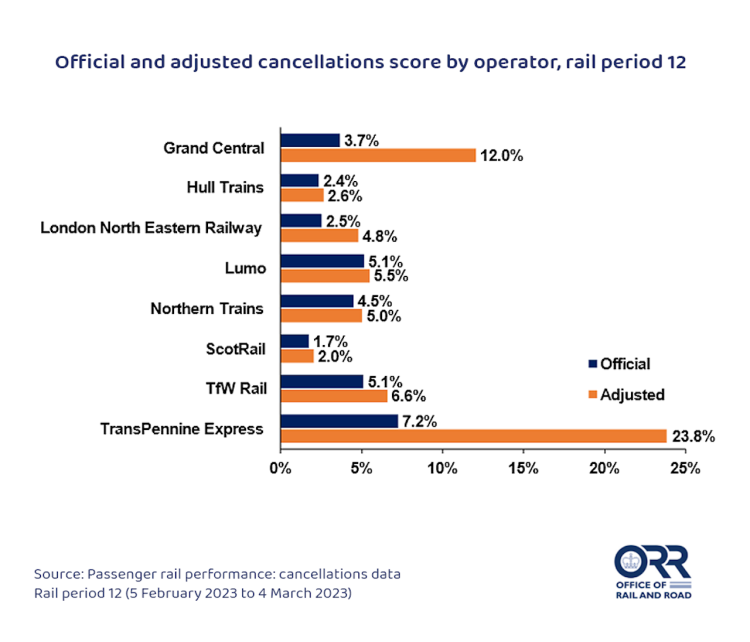The Office of Rail and Roads' latest statistics have revealed that TransPennine Express has continued with its pre-cancellation issues with around a quarter of services cancelled.
The figures show that over a four-week period from the 5th of February to the 4th of March that the rail operator's score had worsened significantly from 7.2% to 23.8% after adjustments were made to include pre-cancellations caused by a shortage of available train crew.
“Pre-cancellation” is also referred to as “P*-coding” and is a general informal term used for cancellations which are made prior to the day when the train is removed from a timetable.
The latest figures show that TransPennine Express have fully pre-cancelled or P*-coded a massive 1,093 and partially pre-cancelled 532 trains.
At present, a plan suitable for this purpose is still yet to be implemented and until this usage of pre-cancellations ends, the regulator will publish data in order to provide complete transparency.
The data recorded covers pre-cancellations made because of the availability of train operator staff or rolling stock only.
Further types of pre-cancellation such as severe weather or major continual infrastructure unavailability, are not included as part of this data.

Feras Alshaker, Director, Planning & Performance, said,
“Until we are satisfied that official statistics reflect passenger experiences, we will make sure that information on service reliability is available for passengers and stakeholders.
“We acknowledge that ongoing strike action has led to a refocusing of resources elsewhere, but this should not deflect from the fact that this needs to be sorted as a matter of urgency.
“We'll continue to publish pre-cancellation data until we're satisfied and should we not have a satisfactory plan from the industry by the end of April, we will consider imposing a change in the way these services are recorded.”
Eight train operators out of 24 in Britain have reported the recording of resource availability shortage (P*-coded) pre-cancellations are part of The Office of Rail and Roads statistics which were published on the 17th of March.
Both Northern Trains and ScotRail have detailed substantial numbers of full pre-cancelled services because of a shortage of available train crew with figures of 380 and 159 respectively.
Transport for Wales has also reported 98 full and 159 part pre-cancellations because of a shortage of available trains.
Due to the inclusion of pre-cancellations in the data, an increase in the national cancellation score of 0.4% points has seen it rise to 3.3%.
Transpennine is particularly vulnerable to P-coding due to staffing issues because of its fleet strategy. It’s fleet is made up of 4 different sub-fleets of trains, all with different training requirements, meaning that getting staff fully trained was always going to be an issue. It has Class 185′, 802’s, 397’s, and Class 68/Mk5’s. Considering that transpennine is a relatively small operator, this makes for an overly complex fleet training program. Transpennine should have gone with a single standardised fleet of electrification ready Bi-mode trains which could be driven by any driver, on anyone of their routes, with common training. A single fleet of Class 802’s should have been ordered. It would have made things so much simpler, and fulfilled all requirements.
Trans Pennine are doing huge reputation damage to the industry. I simply would not use them if I had another option. I travel frequently from Manchester airport to York and it is rare for a train not to be late, to have my seat bookings on board, not to be cancelled on the day, or uncomfortably over crowded or P coded. One journey took four hours and three changes that would not have been needed if services ran as timetabled. It’s not pleasant not knowing if you will be able to complete a journey. The service is a shadow of pre covid. There are few trains to the major international airport and they are often as few as three coaches. Amazingly the on train staff remain polite and helpful in trying circumstances. But the Government needs to act.
I am not sure why the Government doesn’t act here, against all train operators who, whilly nilly, invoke the p code practice.It is totally dishonest and too easy to do and then the operator does not have to pay delay repay compo.
If the rail strikes might becoming to an end ( and today 17 March it appears that might be happening), it would be good if the Government made some interventions that are within their”gift”.These would be ending the pcode swindle, putting Transpenine Express into hands of Operator of Last Resort ( could be absorbed into OOL,s North Rail management) and doing the same to Avanti West Coast asap.
Maybe Government might get flack from Labour but Government could dress up these action as acting decicively in interested of passengers.
I don’t believe this shows the true picture. I strongly suspect South Western Railway (which, like TPE, is owned by FirstGroup) is also engaging in pre-cancellations. On two recent occasions, series of trains have been cancelled without prior warning. They weren’t advertised or announced as cancelled but simply vanished from screens on days when no NR engineering work was taking place. I’ve challenged SWR to admit to this, but it has yet to respond. TOCs should be penalised for deliberate P-coding as it’s basic dishonesty and needs to stop.